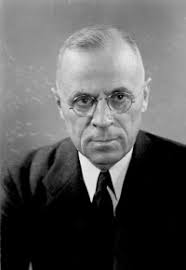Sutherland, Edwin H.

Bio: (1883-1950) American sociologist and criminologist. Edwin Sutherland received his doctorate from the University of Chicago and later taught at several colleges, including the Universities of Chicago and Indiana. Sutherland is best known for his contributions to the development of the sociology of crime, and his book Principles of Criminology (1924) was the most influential criminological book of the first half of the twentieth century in the United States. In this book, which has undergone many revised editions, Sutherland presented his sociological theory of crime. According to Sutherland, crime is exclusively related to social factors, and hereditary and biological factors do not play any role. He singled out race and ethnicity, social classes, and immigration as the most important structural factors of crime.
He developed the theory of "differential association" to explain the adoption of criminal behavior by individuals. Differential association refers to the understanding that people, during their lifetime, come into contact with different types of people, who have different perceptions about the acceptability of crime. This theory is based on the view that criminal behavior is, for the most part, acquired and learned through interaction in small groups. At the same time, individuals learn the techniques used to commit a crime but also adopt the motivation to commit those crimes. Motivation, which consists of attitudes, urges, and definitions, is key to the process of learning criminal behavior. Sutherland stated that criminals do not become criminals just because they were in the company of other criminals, but because a situation arose in which the definition of the acceptability of a crime could be applied. He does not believe that criminal behavior is a product of the general needs and attitudes of the wider population, because only those who join small criminal groups actually commit crimes.
Sutherland also conducted monographic biographical research, on the case of a thief, and the results of the research are presented in the book The Professional Thief (1937). In the book White Collar Crime (1949), Sutherland studies criminal acts committed in the workplace by individuals in high positions and highly paid professions. These criminal acts include bribery, corruption, violations of trade and security regulations, industrial theft and espionage, false advertising, and similar acts. He was very critical of such criminal acts and believed that they happen much more often than ordinary citizens think and that these acts and their perpetrators are punished much more leniently and less often than criminal acts of the rest of the population.
Fields of research
Crime Diffusion Ethnicity Group Homelessness Immigration Motivation Professions Psychology SubcultureTheoretical approaches
Chicago SchoolMain works
Principles of Criminology (1924);
Twenty Thousand Homeless Men (1936);
The Professional Thief (1937);
„The Development of the Concept of Differential Association”, in Ohio Valley Sociologist (1941);
White Collar Crime (1949);
„The Diffusion of the Sexual Psychopath Laws”, in American Journal of Sociology (1950).

